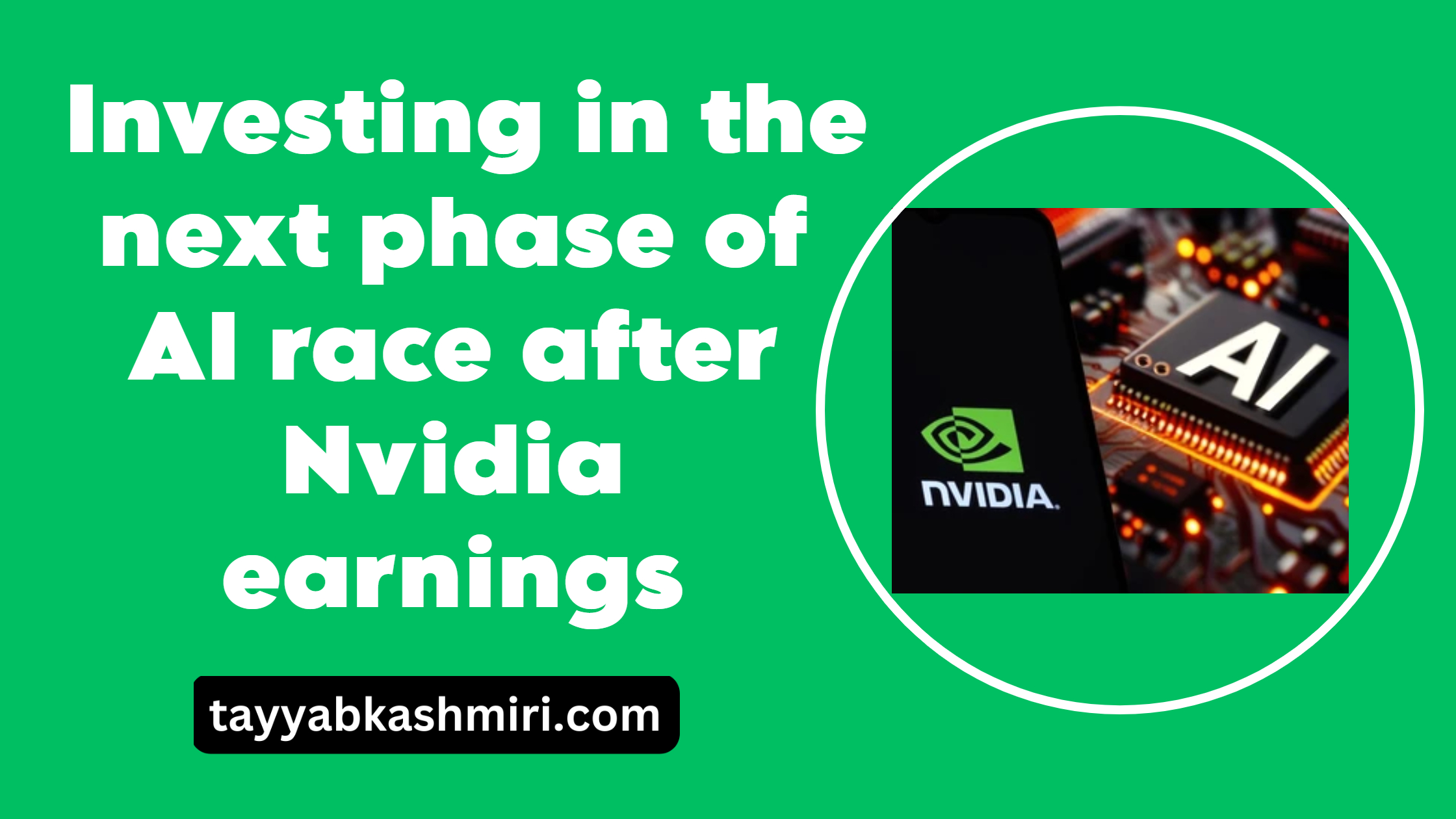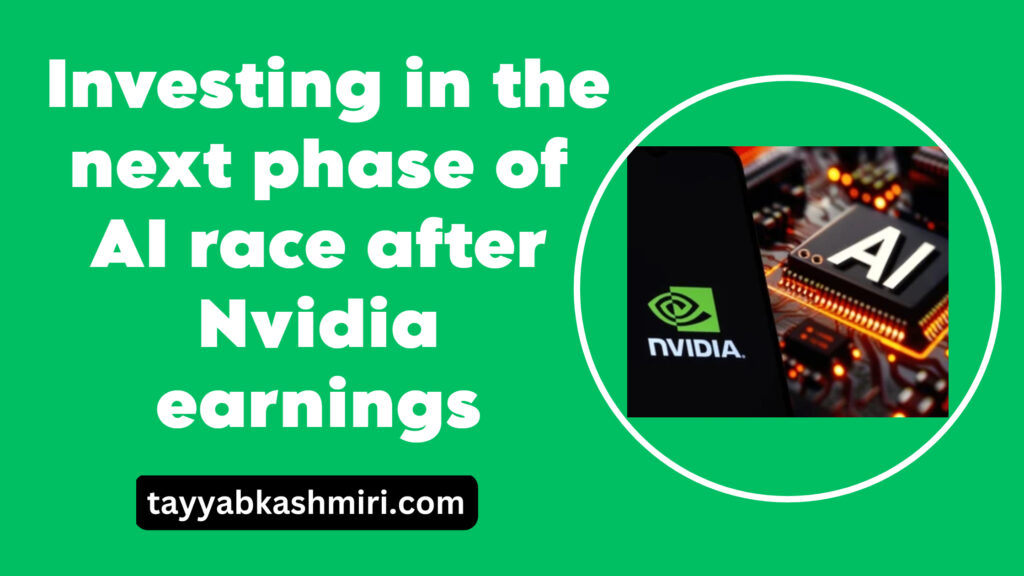Investing Ai Race After Nvidia Earnings

The AI Revolution is Just Getting Started
The recent earnings report from Nvidia, a leading manufacturer of graphics processing units (GPUs), has reignited the AI race among tech giants and investors alike. Nvidia’s impressive financial performance, driven by the surging demand for its AI-focused chips, has underscored the immense potential of artificial intelligence (AI) and its applications across various industries.
As the world stands on the cusp of an AI revolution, investors are scrambling to position themselves strategically in this rapidly evolving landscape. The question on everyone’s mind is: Where should we invest to capitalize on the next phase of the AI race?
Understanding Nvidia’s Dominance in the AI Chip Market
The Rise of AI-Focused Chips
Nvidia’s success can be attributed to its early recognition of the crucial role that GPUs play in accelerating AI computations. While central processing units (CPUs) are designed for general-purpose computing, GPUs excel at handling the massive parallel processing required by AI algorithms, such as deep learning and neural networks.
As the demand for AI applications skyrocketed, Nvidia’s GPUs became the go-to choice for researchers, developers, and companies seeking to push the boundaries of AI. From image and speech recognition to natural language processing and autonomous vehicles, Nvidia’s chips have been instrumental in powering a wide range of AI innovations.
Nvidia’s Competitive Advantage
Nvidia’s dominance in the AI chip market can be attributed to several factors:
Early Mover Advantage: Nvidia was one of the first companies to recognize the potential of GPUs for AI computations, giving them a head start in developing specialized hardware and software solutions.
Ecosystem and Partnerships: Nvidia has cultivated a vast ecosystem of developers, researchers, and industry partners, fostering collaboration and driving innovation in AI applications.
Hardware and Software Integration: Nvidia offers a comprehensive suite of hardware and software solutions, including its CUDA parallel computing platform, which simplifies the development and deployment of AI applications.
Research and Development: Nvidia invests heavily in research and development, continuously pushing the boundaries of AI chip performance and efficiency.
Investing Opportunities Beyond Nvidia
While Nvidia’s success has been remarkable, the AI race is far from over. As the demand for AI technologies continues to surge, other companies are vying for a piece of the lucrative pie, presenting potential investment opportunities for those looking to diversify their AI portfolios.
Cloud Computing Giants
Cloud computing providers like Amazon Web Services (AWS), Microsoft Azure, and Google Cloud Platform (GCP) are well-positioned to capitalize on the AI revolution. These companies offer scalable cloud-based AI services, making it easier for businesses to deploy and manage AI applications without the need for specialized hardware or infrastructure.
Additionally, cloud providers are investing heavily in developing their own AI chips and accelerators, aiming to optimize their cloud offerings for AI workloads. For example, AWS has developed its own AI chip called Inferentia, while Google has unveiled its Cloud Tensor Processing Unit (TPU) for accelerating AI computations.
Semiconductor Companies
Beyond Nvidia, other semiconductor companies are making strides in the AI chip market. Intel, a long-time leader in CPUs, has been ramping up its efforts in AI with its Nervana Neural Network Processors (NNPs) and its acquisition of Habana Labs, a prominent AI chip startup.
AMD, another major player in the semiconductor industry, has also been making waves with its Instinct line of AI accelerators, which leverage its high-performance GPUs and specialized AI software tools.
Emerging AI Chip Startups
While the established players dominate the current AI chip market, numerous startups are working on innovative AI chip architectures and accelerators. These startups are exploring novel approaches to AI computation, such as neuromorphic computing, which mimics the structure and function of the human brain.
Investing in promising AI chip startups can offer potential high-growth opportunities, although it comes with higher risks. Investors should carefully evaluate the technological prowess, market potential, and competitive landscape before committing their capital.
Diversifying Your AI Investment Portfolio

Sector Diversification
As the AI revolution continues to unfold, it is essential for investors to consider diversifying their portfolios across various sectors and industries. While the AI chip market is a critical component, AI technologies are permeating almost every aspect of our lives, from healthcare and finance to transportation and manufacturing.
Investing in companies that are leveraging AI to drive innovation and efficiency in their respective industries can provide exposure to the broader AI ecosystem. For example, AI-powered medical imaging solutions, AI-driven financial trading platforms, and AI-enabled logistics optimization are just a few areas where investment opportunities may arise.
Geographic Diversification
The AI race is a global phenomenon, with countries around the world vying to establish themselves as leaders in this transformative technology. Investors should consider diversifying their portfolios geographically to capture opportunities across different regions and markets.
Countries like China, the European Union, and Israel are investing heavily in AI research and development, fostering vibrant ecosystems of startups, academic institutions, and industry collaborations. Investing in AI companies or funds focused on these regions can provide exposure to emerging AI hotspots and potentially lucrative investment opportunities.
Thematic Investing
Another approach to diversifying your AI investment portfolio is through thematic investing. This strategy involves investing in companies or funds that align with specific AI-related themes or applications, such as autonomous vehicles, healthcare AI, or AI-powered cybersecurity solutions.
By focusing on specific AI themes, investors can gain exposure to companies and technologies that are driving innovation and disruption within those domains. This approach can help mitigate risks associated with betting on a single company or sector while capitalizing on the growth potential of emerging AI applications.
Navigating the AI Investment Landscape
Conducting Due Diligence
As with any investment opportunity, it is crucial to conduct thorough due diligence when considering AI-related investments. Investors should evaluate the technological capabilities, intellectual property portfolios, competitive landscapes, and growth potential of the companies or funds they are considering.
Seeking guidance from AI experts, industry analysts, and experienced investors can provide valuable insights into the intricacies of the AI landscape and help identify promising investment opportunities.
Assessing Risks and Rewards
Investing in the AI race comes with its own set of risks and rewards. On the one hand, the potential for disruptive innovation and exponential growth in the AI sector can yield substantial returns for early investors. However, the rapid pace of technological advancement, intense competition, and regulatory uncertainties surrounding AI introduce significant risks that must be carefully evaluated.
Investors should consider their risk tolerance, investment horizons, and overall portfolio objectives when allocating capital to AI-related investments. Diversification, both within the AI sector and across other asset classes, can help mitigate risks and achieve a balanced investment portfolio.
Staying Informed and Adaptive
The AI landscape is constantly evolving, with new breakthroughs, emerging technologies, and shifting market dynamics. To navigate this ever-changing environment successfully, investors must stay informed about the latest developments, trends, and opportunities in the AI space.
Attending industry events, following thought leaders and experts, and maintaining a close eye on regulatory developments can help investors stay ahead of the curve and make informed investment decisions.
Additionally, investors should be prepared to adapt their strategies as the AI race unfolds. Remaining flexible and open to adjusting their portfolios based on new information and market conditions will be crucial for capitalizing on the opportunities presented by the AI revolution.
The Ethical Considerations of AI Investing
As investors seek to capitalize on the AI revolution, it is crucial to consider the ethical implications of this transformative technology. AI has the potential to reshape virtually every aspect of society, from healthcare and education to security and governance, making it imperative to prioritize responsible development and deployment.
Addressing Bias and Fairness
One of the key ethical concerns surrounding AI systems is the potential for bias and unfair discrimination. AI algorithms are trained on data, and if that data reflects societal biases or historical inequalities, the resulting AI models can perpetuate and amplify those biases. This can lead to discriminatory outcomes in areas such as hiring, lending, and criminal justice.
Investors should prioritize companies and initiatives that are actively working to address bias and promote fairness in AI systems. This may involve investing in technologies that enable bias detection and mitigation, as well as supporting research and development efforts focused on ethical AI practices.
Protecting Privacy and Data Rights
The development of AI systems often relies on vast amounts of data, including personal information and sensitive data. As AI technologies become more sophisticated and ubiquitous, concerns around data privacy and individual rights arise.
Investors should prioritize companies that have robust data governance practices, prioritize data privacy and security, and comply with relevant regulations and guidelines. Supporting initiatives that promote data rights and responsible data stewardship can help mitigate potential reputational and legal risks associated with AI investments.
Ensuring Transparency and Accountability
Many AI systems, particularly those based on deep learning algorithms, operate as “black boxes,” making it challenging to understand how they arrive at their decisions or outputs. This lack of transparency raises concerns about accountability, particularly in high-stakes applications such as healthcare, finance, and law enforcement.
Investors should seek out companies and initiatives that are committed to developing interpretable and explainable AI systems, as well as advocating for industry-wide standards and best practices for AI transparency and accountability.
Navigating Ethical AI Investing
Addressing the ethical considerations of AI investing requires a multi-faceted approach. Investors can support companies and initiatives that prioritize ethical AI development, engage with policymakers and regulators to promote responsible AI governance, and collaborate with academic institutions and non-profit organizations working on ethical AI frameworks.
Additionally, investors can leverage their influence as shareholders to advocate for greater transparency, accountability, and ethical practices within the companies they invest in. By prioritizing ethical considerations alongside financial returns, investors can contribute to the responsible development and deployment of AI technologies, mitigating risks and fostering a more equitable and trustworthy AI ecosystem.
The Future of AI Investment
As the AI race continues to accelerate, the investment landscape is poised for significant transformation. While current AI technologies are primarily focused on narrow or specialized tasks, the pursuit of artificial general intelligence (AGI) – AI systems with general intelligence on par with or surpassing human capabilities – is driving significant research and development efforts.
Investing in AGI Research and Development
The quest for AGI represents a monumental technological and scientific challenge, with the potential to revolutionize virtually every industry and aspect of human civilization. While the path to achieving AGI remains uncertain, investors are beginning to recognize the immense potential and long-term implications of this pursuit.
Investing in companies, research institutions, and initiatives focused on AGI research and development can position investors at the forefront of this transformative endeavor. However, it is crucial to approach AGI investments with a long-term perspective, as breakthroughs in this field may take decades or longer to materialize.
Preparing for an AGI-Powered Future
The advent of AGI could profoundly disrupt existing business models, industries, and societal structures. As such, investors should begin considering the implications of an AGI-powered future and position themselves strategically to capitalize on the opportunities and mitigate the risks associated with this paradigm shift.
This may involve investing in industries and technologies that are expected to thrive in an AGI-enabled world, such as advanced manufacturing, sustainable energy, and human-machine collaboration tools. Additionally, investors should monitor and support initiatives focused on addressing the societal, economic, and ethical challenges that AGI may pose, such as workforce displacement, wealth redistribution, and the need for robust AI governance frameworks.
Embracing Uncertainty and Adaptability
The pursuit of AGI and the implications of its eventual realization are shrouded in uncertainty. Investors must embrace this uncertainty and cultivate a mindset of adaptability, recognizing that the path to an AGI-powered future may be non-linear and unpredictable.
Remaining agile and open to pivoting investment strategies as new developments and insights emerge will be crucial. Investors should continuously reassess their portfolios, diversify across multiple AI-related opportunities, and stay informed about the latest advancements and trends in the AGI realm.
By embracing the uncertainty and complexity of the AGI quest, investors can position themselves to navigate the evolving AI landscape and potentially reap substantial rewards from this monumental technological endeavor.
AI and the Future of Work
One of the most significant implications of the AI revolution is its potential impact on the future of work and employment. As AI systems become more advanced and capable of automating a wide range of tasks, concerns about job displacement and workforce disruption have emerged.
The Automation of Jobs
Many analysts and experts predict that AI and automation will lead to the displacement of workers in various industries, particularly those involving routine and repetitive tasks. Industries such as manufacturing, transportation, and certain service sectors may experience significant job losses as AI-powered systems and robots take over human roles.
However, it is essential to recognize that automation has been a natural progression throughout history, with new technologies often displacing certain jobs while creating new opportunities in other areas. The challenge lies in managing this transition and ensuring that displaced workers are equipped with the skills and resources to adapt to the changing job market.
Investing in Workforce Reskilling and Upskilling
As investors seek to capitalize on the AI revolution, it is crucial to consider the societal implications of job displacement and workforce disruption. Investing in initiatives and companies focused on workforce reskilling and upskilling can help mitigate the negative impacts of automation and create new employment opportunities.
This may involve supporting educational programs, vocational training initiatives, and companies developing AI-powered learning and skill development platforms. By investing in human capital and promoting continuous learning, investors can contribute to a more resilient and adaptable workforce, better equipped to thrive in an AI-driven economy.
Human-AI Collaboration and Augmentation
While AI and automation may displace certain jobs, it is also important to recognize the potential for human-AI collaboration and augmentation. AI systems can enhance human capabilities by taking over repetitive and tedious tasks, allowing humans to focus on more creative, strategic, and decision-making roles.
Investors should consider companies and initiatives that are exploring ways to integrate AI into various industries and professions, augmenting human capabilities rather than entirely replacing human workers. This could involve investing in AI-powered tools and platforms that enable human-AI collaboration, as well as supporting research and development efforts focused on enhancing human-machine interactions.
Navigating the Future of Work
The impact of AI on the future of work is a complex and multifaceted issue that requires a holistic approach. Investors should engage with policymakers, industry leaders, and labor organizations to promote responsible AI adoption and mitigate the negative impacts on employment.
Additionally, supporting initiatives focused on fostering an inclusive and equitable transition to an AI-driven workforce can help ensure that the benefits of AI are distributed fairly and that no segment of society is left behind.
By addressing the challenges and opportunities associated with the future of work, investors can contribute to a more sustainable and socially responsible AI ecosystem, while positioning themselves for long-term success in an AI-powered economy.
Responsible AI Governance and Regulation
As the AI revolution continues to unfold, the need for robust governance frameworks and regulatory oversight becomes increasingly crucial. The potential risks and societal implications of AI technologies underscore the importance of establishing clear guidelines, standards, and accountability measures.
Promoting Trustworthy and Ethical AI
One of the key challenges in AI governance is ensuring the development and deployment of trustworthy and ethical AI systems. This involves addressing issues such as algorithmic bias, data privacy, transparency, and accountability, as well as establishing ethical principles and guidelines for AI developers and companies.
Investors should prioritize companies and initiatives that are actively engaged in promoting trustworthy and ethical AI practices. This may involve supporting organizations and initiatives focused on developing ethical AI frameworks, best practices, and certification programs.
Navigating the Regulatory Landscape
As the adoption of AI technologies accelerates, governments and regulatory bodies around the world are grappling with the challenge of establishing appropriate regulations and oversight mechanisms. While some regions, such as the European Union, have taken proactive steps with initiatives like the AI Act, others are still in the early stages of developing AI-specific regulations.
Investors should closely monitor the evolving regulatory landscape and engage with policymakers and industry stakeholders to shape responsible AI governance frameworks. This can help mitigate potential risks, ensure compliance, and foster a more predictable and stable environment for AI investments.
Collaborative Governance and Multi-Stakeholder Engagement
Effective AI governance requires collaboration among various stakeholders, including governments, industry players, civil society organizations, and academic institutions. By fostering multi-stakeholder engagement and dialogue, investors can contribute to the development of balanced and inclusive AI governance frameworks that consider diverse perspectives and address a wide range of societal implications.
Supporting initiatives that promote cross-sectoral collaboration, knowledge-sharing, and capacity-building can help create a more cohesive and coordinated approach to responsible AI development and deployment.
Investing in AI Governance and Regulation
While AI governance and regulation may not directly generate financial returns, investing in initiatives and organizations focused on these areas can help mitigate potential risks and create a more stable and trustworthy AI ecosystem, ultimately benefiting long-term investment strategies.
Investors can support research and advocacy efforts, contribute to industry self-regulatory initiatives, and engage with policymakers to promote responsible AI governance. By prioritizing these efforts, investors can foster a more sustainable and socially responsible AI revolution, while positioning themselves for long-term success in an increasingly AI-driven world.
Conclusion
The AI race has entered an exciting and transformative phase, fueled by Nvidia’s impressive earnings and the growing demand for AI technologies across various sectors. As investors navigate this landscape, diversifying their portfolios and considering the broader implications of AI development will be crucial.
Addressing ethical considerations, preparing for the advent of artificial general intelligence, and proactively addressing the impacts of AI on the future of work are all essential components of a responsible and forward-thinking AI investment strategy.
Moreover, supporting robust AI governance frameworks, promoting trustworthy and ethical AI practices, and fostering multi-stakeholder collaboration can contribute to a more sustainable and socially responsible AI ecosystem, mitigating risks and positioning investors for long-term success.
As the AI revolution continues to unfold, those who embrace this disruptive technology with a balanced and responsible approach – considering both financial returns and societal implications – will be best positioned to reap the rewards and shape a better future for all.
Free Earn Money Online: Visit Here
FAQs: Investing in the AI Race After Nvidia Earnings
Q: Why is Nvidia’s earnings report so significant for the AI industry?
A: Nvidia’s impressive earnings, driven by surging demand for its AI-focused chips, showcased the immense potential of artificial intelligence (AI) and its applications across various industries. This has reignited the AI race among tech giants and investors, as they seek to capitalize on the transformative power of AI.
Q: What makes Nvidia’s GPUs well-suited for AI computations?
A: Nvidia’s graphics processing units (GPUs) excel at handling the massive parallel processing required by AI algorithms, such as deep learning and neural networks. This gives Nvidia a competitive advantage in the AI chip market, as GPUs are better suited for AI workloads compared to traditional central processing units (CPUs).
Q: Beyond Nvidia, what other investment opportunities exist in the AI chip market?
A: Other semiconductor companies like Intel, AMD, and emerging AI chip startups are also making strides in the AI chip market. Additionally, cloud computing giants like Amazon Web Services (AWS), Microsoft Azure, and Google Cloud Platform (GCP) are well-positioned to capitalize on the AI revolution through their scalable cloud-based AI services.
Q: How can investors diversify their AI investment portfolios?
A: Investors can diversify their AI portfolios by investing across various sectors (e.g., healthcare, finance, transportation), geographies (e.g., China, Europe, Israel), and thematic areas (e.g., autonomous vehicles, healthcare AI, cybersecurity). This helps mitigate risks and capture opportunities across the broader AI ecosystem.
Q: What ethical considerations should investors keep in mind when investing in AI?
A: Investors should prioritize companies and initiatives that address issues like algorithmic bias, data privacy, transparency, and accountability. Supporting ethical AI practices, responsible data governance, and initiatives promoting fairness and inclusivity in AI development is crucial.
Q: How will the pursuit of artificial general intelligence (AGI) impact AI investments?
A: While current AI technologies are focused on narrow or specialized tasks, the quest for AGI – AI systems with general intelligence on par with or surpassing human capabilities – represents a monumental technological challenge. Investing in AGI research and development, while risky, could position investors at the forefront of this transformative endeavor.
Q: What is the potential impact of AI on the future of work, and how should investors approach this?
A: AI and automation may lead to job displacement in certain industries, but they could also create new employment opportunities. Investors should consider supporting workforce reskilling and upskilling initiatives, as well as companies exploring human-AI collaboration and augmentation.
Q: Why is responsible AI governance and regulation important for investors?
A: Robust AI governance frameworks and regulations can help mitigate potential risks, ensure compliance, and foster a more predictable and stable environment for AI investments. Investors should engage with policymakers and support initiatives promoting trustworthy and ethical AI practices.
By addressing these frequently asked questions, investors can gain a better understanding of the opportunities and challenges associated with investing in the AI race, and make more informed decisions to navigate this rapidly evolving landscape.








